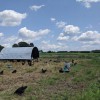
But during the last century, the rise of chemical-based agriculture has dramatically changed the way we produce our food. Increasingly corporate and mechanized, today's conventional farms are saturated with artificial fertilizers, pesticides, and herbicides that are engineered to reduce the burden of labor while keeping crop yields high.
However, we have failed to recognize the unintended consequences of conventional, chemical-based farming practices. Soil health degradation, loss of organic matter and erosion, as well as water pollution, toxic residues in our food supply, and lack of biodiversity- to name a few. We have also failed to recognize what is at stake.
However, we have failed to recognize the unintended consequences of conventional, chemical-based farming practices. Soil health degradation, loss of organic matter and erosion, as well as water pollution, toxic residues in our food supply, and lack of biodiversity- to name a few. We have also failed to recognize what is at stake.
Services
Why Organic
Report
This isn't just about food. Organic is a vision for working and living in harmony with nature. The result is healthy soil, which grows healthy plants, which make for healthy people. By abstaining from synthetic inputs and encouraging natural systems, organic farmers help create a better future for people, animals, and the environment.
Organic vs Conventional
Report
Organic agriculture is a production system that regenerates the health of soils, ecosystems, and people. Organic farmers rely on natural processes, biodiversity, and cycles adapted to local conditions rather than the use of synthetic inputs like chemical fertilizers, pesticides, and herbicides. GMOs are not allowed in organic.
Organic Certification
Report
In order to label and sell their products as organic, farmers and food processors must undergo a certification process. In the United States, the standards for organic certification are set by the USDA. The process is backed by the National Organic Standards Board, a volunteer group of organic farmers, retailers, environmentalists, scientists, certifying agents, and consumer advocates.
Regenerative Organic Agriculture
Report
Robert Rodale, J.I. Rodale's son, coined the term "regenerative organic" to distinguish a kind of farming that goes beyond sustainable. Soil health is intrinsically linked to the total health of our food system. Soil health affects everything from plant health to human wellbeing and the future of our planet.
How Can I Make a Difference
Report
Every time you choose organic, you vote for clean air and water, nutritious food, and resilient soil. You vote for a better, brighter future-one in which human health goes beyond measures of blood pressure and calories to encompass true well-being. In the grocery store, look for the USDA Certified Organic Seal-it's your best bet for ensuring the product was grown and produced without harmful chemicals.
Reviews

Be the first to review Rodale Institute Experimental Farm.
Write a Review